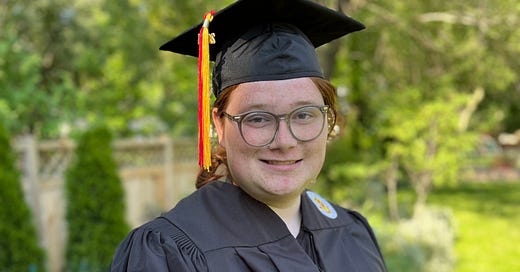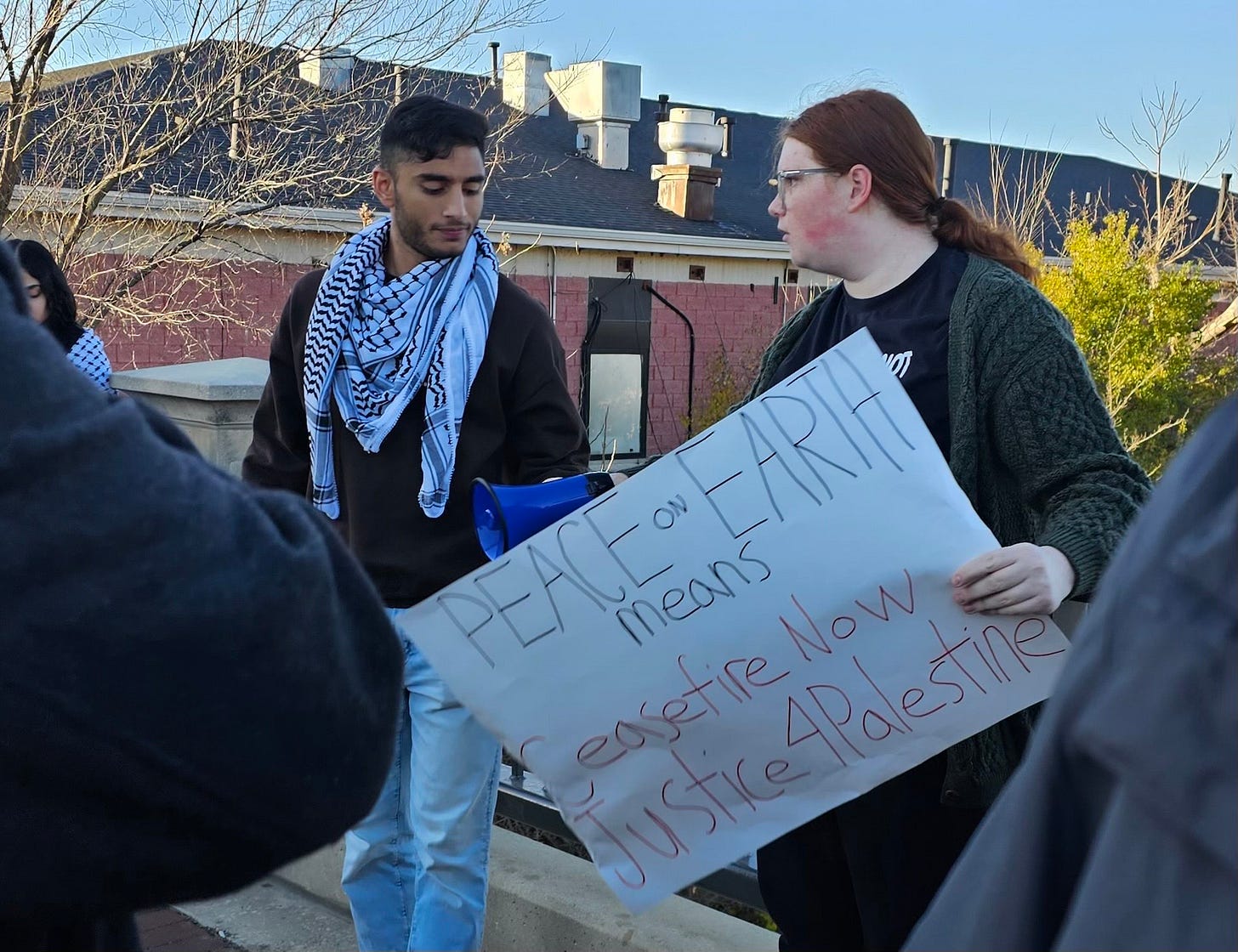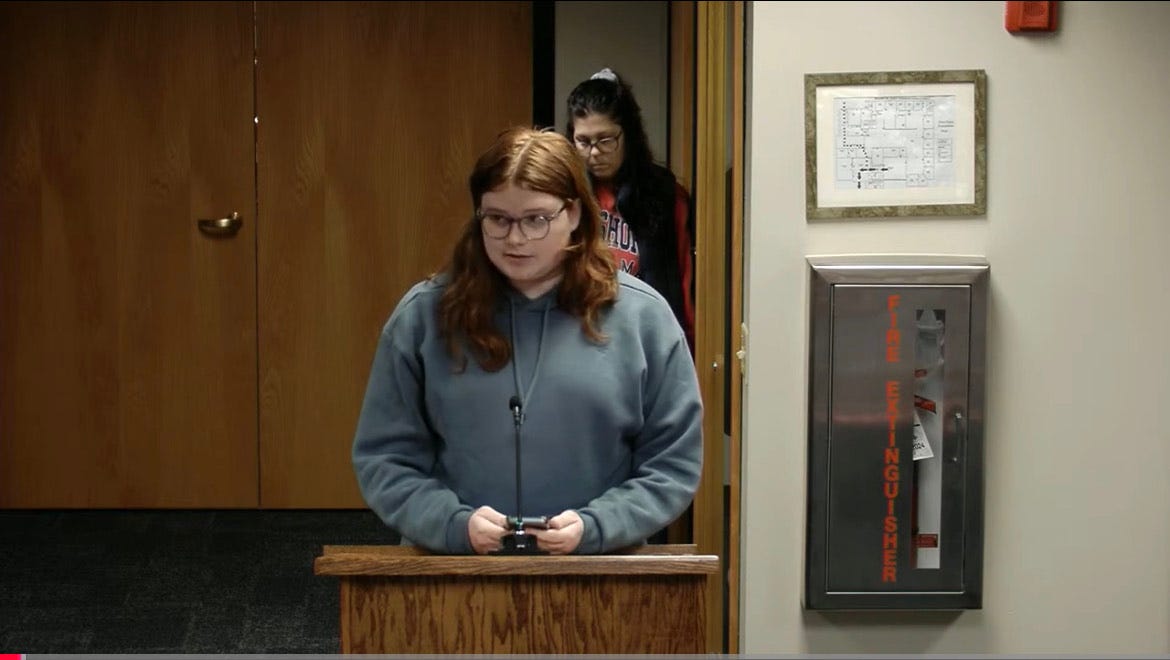where this gen z queer activist is looking for optimism now.
I spoke with Batavia activist Martin Beirne on the eve of the release of their new zine, New Trees.
Queering the Burbs is a regularly-published distillation of pop culture, politics and queerness written by Joe Erbentraut. If you like what you see, please consider subscribing (it’s free!), liking or sharing this piece. Order Joe’s new zine, Issue #01, here.
There are a few things that start to happen once you publish a zine and release it into the world. If you’re lucky, some people buy it (thank you!). If you’re really lucky, others send comments and emails telling you that they liked it (thank you!). And if you are really, truly, OMG lucky, you find out that your zine inspired somebody else to take the leap to officially put their words down on paper for the first time.
That’s exactly what’s happening with 18-year-old Martin Beirne, who this week is releasing New Trees: A Radical Consideration of the American System Amid Trump’s Second Term, their very first zine.
Beirne, who identifies as queer and nonbinary, graduated from Batavia High School last spring and if you’ve paid any attention to what’s going on politically in our little town, their name should be a familiar one. They’ve spoken at our school board and City Council meetings more times than I can count, including playing a big role in lobbying the council to pass a Gaza ceasefire resolution last year.
Beirne has also been outspoken as a student leader at the high school, advocating for the district to do a better job supporting its queer students—and that work continues to this day, even though they are now a freshman studying political science at Temple University in Philadelphia. Last month, while home for winter break, they spoke at a school board meeting in defense of a staff member facing backlash from right-wing groups over a book she included in her curriculum.
I’ve long admired Beirne’s outspokenness. When I was their age, I was just beginning to step out from the closet. I was often too shy to speak up in a classroom, much less in front of a school board, City Council, or political rally. Seeing people like Beirne speak out for a better community and a better world is something that gives me real hope for our future during these dark times, less than one week from a convicted felon being inaugurated to the White House.
We recently met up for a long-overdue conversation just days before Beirne headed back east to start their second semester. Our conversation has been edited for length and clarity. You can now pick up a copy of Beirne’s new zine from Annie Hex’s website.
What was your original introduction into organizing and speaking out politically? Most people don’t start quite so young.
I've always had a strong sense of justice and an eye for injustice. I've always been sensitive to that, and sensitive to people who are suffering, so it wasn't unnatural for me to start speaking out. It’s just a part of who I am. I've worked on political campaigns since I was 12 actually, and the first public meeting I spoke at was during my sophomore year of high school, in front of the school board.
Is your family involved with organizing like this too? Was that kind of going on in your household or very much not?
No, but what I will say about my family, because this is important, and I think an important element of why I do what I do, is my mom passed away when I was 19 months old. She passed away when I was very young, but parts of her live on in me and in my twin sister. I believe that when our bodies die, our love doesn't die and that stays in the world. She was a social worker and she worked for the DC government as an advocate for children in the foster care system. I think that what I'm doing is exactly what she was doing, just in different ways. She always looked out for and advocated for the people that needed it.
Now that you've graduated and you're going to Temple, you have a little bit of physical distance and maybe also just emotional distance from everything going on here, in your hometown. What is it like for you to look back on your time in Batavia and your advocacy work now? What are some of your proudest things that you achieved in that time?
Something that I never intended to do and I never thought I was doing, was to inspire other people to speak out and then they've in turn inspired other people. That, to me, is empowering because when we do good things and we do hard things, but good things and important things we don't know who’s watching, and I mean that in a positive way. We can inspire other people, so that's been a source of pride.
I mean, the world is shit right now. We have a lot of problems. I can't say that I'm leaving Batavia in great shape, but there are a lot of good people here doing the work still and that does give me hope.
What are some things going on in Batavia right now where you're like, wow, this is still happening? For example, I saw that you spoke at the Batavia school board meeting in December after some staff members were called into question by an alt-right group over a particular book selection during a previous meeting.
Well, frankly, we keep talking about the same shit because there's board members who keep pretending that they're hearing this shit for the first time, even though they've been on the board for years.
What do you hope to really see happen at BPS when it comes to these issues you’ve been speaking to in recent years at these board meetings — the bullying, safety of LGBTQ+ students and other marginalized folks. What do you think are some of the biggest obstacles to what you hope to see?
I hope to see a school district that works for everyone that it serves. And what are the obstacles to that? I think at the local level, it's leadership. We have board elections on April 1, and I want to see some new board members. Beyond that, I think our education system, and this is far bigger than Batavia, was not made to work for all students.
Here we are meeting on January 6, the fourth anniversary of the insurrection. We have this new administration coming in a matter of weeks. How are you feeling about this moment that we're in, of this new administration coming in?
I’m scared. I've had anxiety all my life, but my anxiety has been worse now than it has been in a very long time. And I think something happened with ringing in the new year, wondering what the hell is this year going to be? I am scared. Usually I'm angry and not scared, but now I'm more scared than angry. And I wish I was angry because I think that good things can come from anger and I think it's harder for good things to come from fear. But I think that this is something that so many of us are dealing with, so many that are frankly living in the real world and are aware and have a heart.
I don't have any faith in America, and I haven't had any faith in America for a long time well before the election. The election proved my lack of faith. But I do believe in us. I do believe in people. I do believe in communities, even though I don't believe in empires. And we need to have optimism—not optimism in a naive way, in a wishy-washy, ridiculous way, but in a way that allows us to keep going, to live another day, and resist another day. Because as long as we are alive, we have the capability to resist and to believe that a better world is possible. Because if we don't have that optimism, we have nothing.
I love this quote from Antonio Gramsci, who was an Italian anti-fascist and he said this while he was imprisoned under Mussolini’s regime: "I am a pessimist because of intelligence, but an optimist because of will.” I really believe that, because if you are looking at what we know and you're looking at the facts and the evidence pretty much points to being pessimistic. But optimism can come from will, and that's what gives me optimism. I could be completely wrong, but I'm okay being wrong about that because, again, if we let go of that optimism or we can't find that optimism, then we have nothing, then we are dying without trying.
You are one of the first Gen Z folks I’ve interviewed for this newsletter. What do you think people get wrong about Gen Z and queerness?
I’ve heard my generation get called the Heartstopper generation. That is a show that I love, and it's very sweet and a heartwarming, cute, nice show, so there's an idea that’s out there that for this generation, our queerness hasn't made us suffer, that society's at a place now where it's no big deal. I think that that is true for some members of my generation and I think that we have had it easier in many ways, and it's because of the queer people that came before us.
At the same time, while the Heartstopper generation is some people's reality, it’s a reality that's very much not the case for many people. We still have so many queer suicides, the healthcare bans that we didn't have before, and “don’t say gay” laws, and queer book bans, and all that shit. So it is not a constant that things just get better. What we're seeing with Trump and the reactionaries right now is that progress is not permanent and it's actually susceptible to being reversed, and that's not because of the moral arc of the universe, in my opinion. It’s because people sacrifice for it and people work hard for it.
How do you think folks in the queer community—especially maybe older, cis white, wealthy folk—and allies can really show up the most vulnerable folks on the front lines, the most marginalized, the younger folks right now. How do you think we can find that optimism and how do we support each other?
That’s a really important question. The question of how we build the world we want and how we resist and how we create change, radical change is a huge question and something that has defined a lot of my thoughts and contemplation. I wish there was a magic formula for it, but there isn't one. Be in touch with people and meet your neighbors. Inform yourself, don’t lose touch of reality, and don’t get distracted by all the things that this society is upheld by distracting us with.
In terms of how we stay optimistic, one of the things that I think can give me that optimism is looking at the sky. I love the sky. It is a constant in every society in this world, for every person that's ever existed. It seems it's the same and it has seen so much. Sometimes I look up at the sky and I ask it for advice, but my problems—even my big problems—seem insignificant to the sky. It makes me feel small and it makes everything in this world feel small. It makes our government feel very small. It makes our oppressors feel very small and reminds me that they are small. As powerful as they are and as dangerous as they are, it just gives me some sort of hope that this world isn't the only world.
Finally, as a representative of queer Gen Z, I wanted to ask: What does queerness mean to you?
To me, queerness is about waking up every day and saying no, about saying no to the life that we're told we're supposed to live, saying no to this society, that this society is not for us. That it doesn't work for us, and so we're going to reject that. We're going to say no, and we're going to do our own thing. I think that that draws well into the moment of resistance that we are in. Because more broadly and queer or not, we need to say no to this society and say, no, this isn't working for us. We're going to build a society that we want.
For more words from queer folks out here doing the work in the western ‘burbs and beyond, read my previous interviews with Batavia artist Annie Hex, Aurora organizer Javi, the organizers of Geneva Pride, Paramount Theatre artistic director Jim Corti, Aurora trans activist Penelope Torres, North Aurora musician Katie Bogle, Hoof & Horn co-owners Jarrod Johnson and Adrian Xavier Frost, Batavia activist Scott Naylor, Youth Outlook’s Carolyn Wahlskog, Ramshackle Farm’s Shannon and Eve Mingalone, Batavia’s Lyndsay Hartman, Aurora activist Fred Yanos, and On Point Nails’ Hailey Conran. As always, your support—via comments, shares and subscriptions—is so deeply appreciated.
I’ve been crushed by the endless devastating photos and videos out of the Los Angeles area as a result of the wildfires in recent days. I just watched a TikTok video of a 93-year-old man named Eric who had just lost everything in the Palisades fire. Where will these people go? How will they rebuild? I don’t have the answers, but I did find this link to a list of verified GoFundMe campaigns supporting individuals who also lost everything in the fires but have yet to surpass 20% of their fundraising goal. LAist also has a detailed guide on how to most effectively help victims of the fires right now. Please give what you can.
SONG OF THE RIGHT-NOW
When Beirne spoke of looking to the sky to gain perspective in difficult times, I thought of one of my all-time favorite musicians: Kate Bush. The iconic Kate has sang many times about the sky in all of its forms, but her most beautiful tribute to it (in my opinion) is called “Sunset.” Off of the second half of her underrated 2005 album Aerial, this is the kind of song that just demands that you strap on some headphones, close your eyes, and let the music pour all over you. If you’re spiraling right now, please tell me you’ll try it.
Keep us close to your heart
So if the skies turn dark
We may live on in
Comets and stars
Take care of yourselves and each other, everyone. We got this.







So proud of Martin and so grateful for all of their influences and help to get their zine out. New Trees is truly where intelligence meets will/hope. It is nothing short of remarkable, and I can’t wait for others to experience it. Martin has made an incredible, everlasting impact on Batavia ❤️
I love that you inspired Beirne to create their own zine and gave them a platform to speak about it and their work. What an inspiring person!